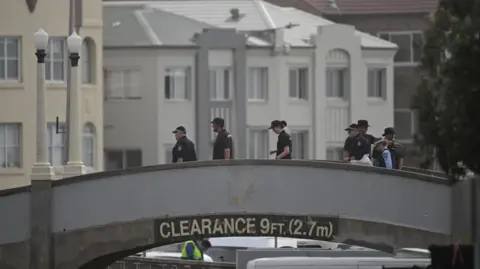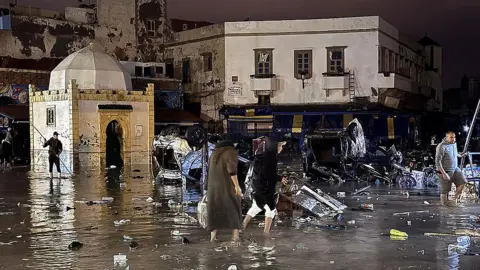Liverpool parade attacker lied about 'panicking' and drove at crowds in rage, court told

 CPS
CPSA man who used his car as a "weapon" to plough into more than 100 people at Liverpool's victory parade told police he did it out of fear and panic, a court has heard.
But prosecutors said these were lies told by Paul Doyle and he had lost his temper and driven at crowds in a rage on Water Street during the celebrations.
At Liverpool Crown Court earlier, victims of his Water Street rampage on 26 May spoke about their terror and injuries.
Sheree Aldridge, 37, said she thought her baby son Teddy Eveson had died after his pram was thrown into the air after being hit by Doyle's car, adding that she thought she would "be next".
She said: "I felt an overwhelming pain in my leg and looked up to see Teddy's pushchair on its side further up the road. I thought my Teddy was dead.
"I thought I was next. I thought my children would grow up without a mother."
Hers was one of a number of victim impact statements read during the first day of Doyle's two-day sentencing hearing, with others describing how they have suffered "emotional and psychological injury" as well as "frequent flashbacks".
- As it happened: 'I've just ruined my family's life,' Paul Doyle told police after Liverpool parade attack
A 12-year-old boy, who cannot be named for legal reasons, said: "I found myself on the floor having been hit by a car I did not see coming, I have never felt so scared before in my life."
The boy's mother said in her statement her heart sank when she saw her child motionless on the floor.
She said: "The sight of my son lying motionless on the road, not moving for those few seconds, and the sound of the car hitting people will live with me forever."

 PA Media
PA MediaIn the back of a police van immediately after the attack, Doyle told officers "I've just ruined my family's life".
He previously pleaded guilty to 31 offences relating to seriously injuring people during the victory parade when thousands of Liverpool fans were in the city.
The former Royal Marine, of Croxteth, Liverpool, changed his plea on the second day of his trial last month.
He admitted to dangerous driving, affray, 17 charges of attempting to cause grievous bodily harm (GBH) with intent, nine counts of causing GBH with intent and three counts of wounding with intent.
Doyle was picking up friends from the parade when, in the space of two minutes between 17:59 and 18:01 BST, he used his Ford Galaxy "as a weapon" and hit more than 100 supporters, Paul Greaney KC, prosecuting, said.
The 54-year-old cried frequently as horrifying CCTV and dashcam footage was played to the court.
In the footage, Doyle can be heard shouting "move" and swearing at the crowd, including after he struck a 10-year-old girl.
Mr Greaney described Doyle as a "man out of control" as a 15-second CCTV clip was played of the moment his vehicle hits Teddy's pram.
The Honorary Recorder of Liverpool, Judge Andrew Menary KC, lifted reporting restrictions preventing the media from publishing the baby's name as his parents had agreed for their son to be identified.
Mr Greaney said Teddy "remarkably" escaped injury.
Five other children, who Doyle either injured or attempted to injure, cannot be named for legal reasons.
Other footage showed the windscreen of his car smashed after a man landed on it.
Mr Greaney told the court: "The strong sense from the dashcam footage is that the defendant regarded himself as the most important person on Dale Street, and considered that everyone else needed to get out of his way so that he could get to where he wanted to get to.
"The truth is a simple one. Paul Doyle just lost his temper in his desire to get to where he wanted.
"In a rage, he drove into the crowd, and when he did so, he intended to cause people within the crowd serious harm.
"He was prepared to cause those in the crowd, even children, serious harm if necessary to achieve his aim of getting through."

 PA Media
PA MediaHe told the court that when Doyle was interviewed by police, he claimed he had stopped the car as soon as he realised he had struck someone.
Mr Greaney said: "The defendant could not have failed to see that he had struck very many people on his journey down Dale Street and Water Street, stopping to reverse and then drive on a number of times."
The court was told a man named Daniel Barr, labelled a "hero" by prosecutors, had "bravely" jumped into the back of the Galaxy and placed the vehicle into park.
"In any event, what brought the Galaxy to a halt was a combination of the number of people trapped beneath the vehicle and the actions of Daniel Barr - not the decision of Paul Doyle," Mr Greaney said.
"[Barr] saw the Galaxy weaving and hitting people, who were sent flying into the air.
"All of a sudden, the vehicle stopped right beside him. Daniel Barr instinctively pulled open the rear passenger-side door and climbed in. He did so with the intention of stopping the driver.
"As the car set off again, he leaned forward and moved the gear selector into "park". He held it there as hard as he could. The Galaxy did not stop immediately, but in the end it did.
"However, Daniel Barr describes how even after he had brought the vehicle to a halt, the defendant continued to keep his foot on the accelerator.
"That proposition is supported by other witnesses, too."
The hearing is set to continue on Tuesday morning.

 PA Media
PA MediaListen to the best of BBC Radio Merseyside on Sounds and follow BBC Merseyside on Facebook, X, and Instagram. You can also send story ideas via Whatsapp to 0808 100 2230.




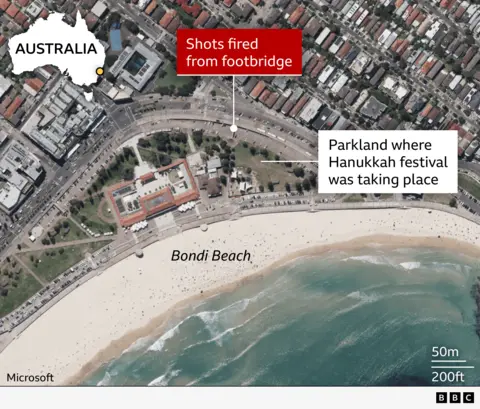
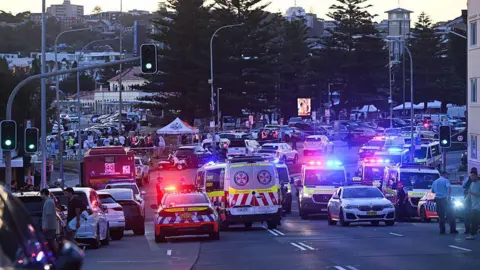
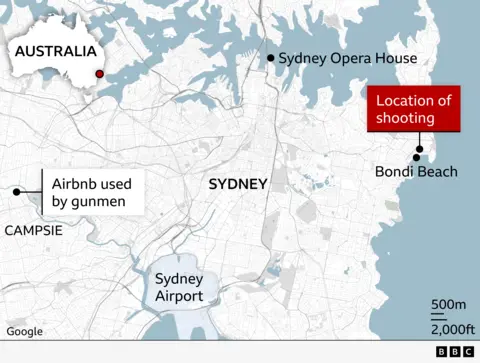
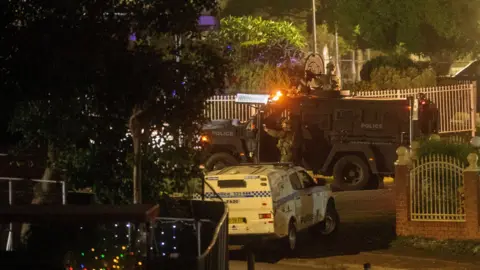

















 “山东号”交接入列:中国第一艘完全国产的航空母舰,同时也是现役第二艘航母周二(2019年112月17日)正式交付使用,并宣布命名为“山东号”。中国党政军最高领导人习近平出席了在海南三亚某军港举行的交接入列仪式。
“山东号”交接入列:中国第一艘完全国产的航空母舰,同时也是现役第二艘航母周二(2019年112月17日)正式交付使用,并宣布命名为“山东号”。中国党政军最高领导人习近平出席了在海南三亚某军港举行的交接入列仪式。 山东舰,舷号17:中共中央军委为这条“大船”正式取名为“中国人民解放军山东舰”,舷号为“17”。交接入列当天,中国海军部队和航母建设单位的约5000名官兵参加了庆祝仪式。
山东舰,舷号17:中共中央军委为这条“大船”正式取名为“中国人民解放军山东舰”,舷号为“17”。交接入列当天,中国海军部队和航母建设单位的约5000名官兵参加了庆祝仪式。 山东号?台湾号?:此前,中国的各大军事论坛盛传该舰将命名为“山东号”,只是这一说法从未得到官方证实。某中国知名门户网站还曾举行网络调查,就首艘国产航母的名称征求意见。结果“台湾号”得到了最多人的支持。
山东号?台湾号?:此前,中国的各大军事论坛盛传该舰将命名为“山东号”,只是这一说法从未得到官方证实。某中国知名门户网站还曾举行网络调查,就首艘国产航母的名称征求意见。结果“台湾号”得到了最多人的支持。 接受洗礼:“山东号”2017年4月26日在中国船舶重工集团公司大连造船厂举行下水仪式,当时还未正式命名的这航母仅有一个编号“001A”。
接受洗礼:“山东号”2017年4月26日在中国船舶重工集团公司大连造船厂举行下水仪式,当时还未正式命名的这航母仅有一个编号“001A”。 当地人眼中的“大船”:虽然多年前就有报道称中国正在建造首艘国产航母,但是直到2015年的最后一天,中国国防部才正式宣布了这一消息。中国媒体介绍,大连当地人习惯把航母叫做“大船”。该航母的长度是315米,相当于三个足球场的长度,其宽度为75米。
当地人眼中的“大船”:虽然多年前就有报道称中国正在建造首艘国产航母,但是直到2015年的最后一天,中国国防部才正式宣布了这一消息。中国媒体介绍,大连当地人习惯把航母叫做“大船”。该航母的长度是315米,相当于三个足球场的长度,其宽度为75米。 建设当中:“001A”航母在建设过程中已受到大量关注。图中是该舰在2017年2月份的样子,舰体上仍有不少支架。
建设当中:“001A”航母在建设过程中已受到大量关注。图中是该舰在2017年2月份的样子,舰体上仍有不少支架。 迎接周年庆:此前外界猜测,这艘航母很有可能在2017年4月23日下水。因为这一天是中国解放军海军成立68周年纪念日。还有消息称,身为中央军委主席的习近平可能亲自出席该舰的下水典礼。但4月26日当天,出席典礼的其实是中共中央政治局委员、中央军委副主席范长龙。
迎接周年庆:此前外界猜测,这艘航母很有可能在2017年4月23日下水。因为这一天是中国解放军海军成立68周年纪念日。还有消息称,身为中央军委主席的习近平可能亲自出席该舰的下水典礼。但4月26日当天,出席典礼的其实是中共中央政治局委员、中央军委副主席范长龙。 “老大”辽宁:中国海军目前唯一现役的航空母舰“辽宁号”是在乌克兰制造的“瓦良格号”基础上改建。曾有专家认为,“辽宁号”并不是真正可以用于军事行动的航母,而是一个用来演习、训练,并进行一步研发的平台。
“老大”辽宁:中国海军目前唯一现役的航空母舰“辽宁号”是在乌克兰制造的“瓦良格号”基础上改建。曾有专家认为,“辽宁号”并不是真正可以用于军事行动的航母,而是一个用来演习、训练,并进行一步研发的平台。 巡游南海:2016年年底,“辽宁号”在南中国海进行演练,并在途中“绕行台湾”,引起国际关注。但台湾媒体援引军方人士指出,辽宁号尚不具备全天候作战能力。若投入实战,仅能发挥3成战力。
巡游南海:2016年年底,“辽宁号”在南中国海进行演练,并在途中“绕行台湾”,引起国际关注。但台湾媒体援引军方人士指出,辽宁号尚不具备全天候作战能力。若投入实战,仅能发挥3成战力。 第三艘航母?:除了“辽宁号”和“山东号”之外,中国目前还有第三艘航母—但其作用只是用来娱乐消遣。前苏联海军的“明斯克号”在90年代末退役后卖给了中国,并在深圳被改造成军事主题公园。
第三艘航母?:除了“辽宁号”和“山东号”之外,中国目前还有第三艘航母—但其作用只是用来娱乐消遣。前苏联海军的“明斯克号”在90年代末退役后卖给了中国,并在深圳被改造成军事主题公园。 “小步快跑”:2016年该舰被拖往舟山整修,据称未来将落户江苏南通。至于中国海军真正的第三艘航母,有消息说正由上海江南造船厂建造。中国军事专家徐光裕少将曾对媒体表示,中国航母的发展策略是“小步快跑”,将来会实现核动力航母。
“小步快跑”:2016年该舰被拖往舟山整修,据称未来将落户江苏南通。至于中国海军真正的第三艘航母,有消息说正由上海江南造船厂建造。中国军事专家徐光裕少将曾对媒体表示,中国航母的发展策略是“小步快跑”,将来会实现核动力航母。 海上霸主:尽管中国投入巨资加强海军力量,但与美国相比仍有一定差距。目前美军拥有十艘现役航母,其中包括最近驶向朝鲜半岛的卡尔·文森号。最新一代的三艘“福特级”核动力航母也正在建造中,全长337米,宽78米,排水量高达十万吨(001A型的相应数据分别是315米,75米和7万吨)。
海上霸主:尽管中国投入巨资加强海军力量,但与美国相比仍有一定差距。目前美军拥有十艘现役航母,其中包括最近驶向朝鲜半岛的卡尔·文森号。最新一代的三艘“福特级”核动力航母也正在建造中,全长337米,宽78米,排水量高达十万吨(001A型的相应数据分别是315米,75米和7万吨)。















































